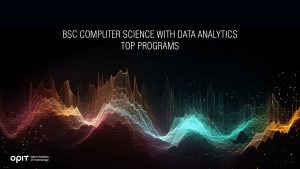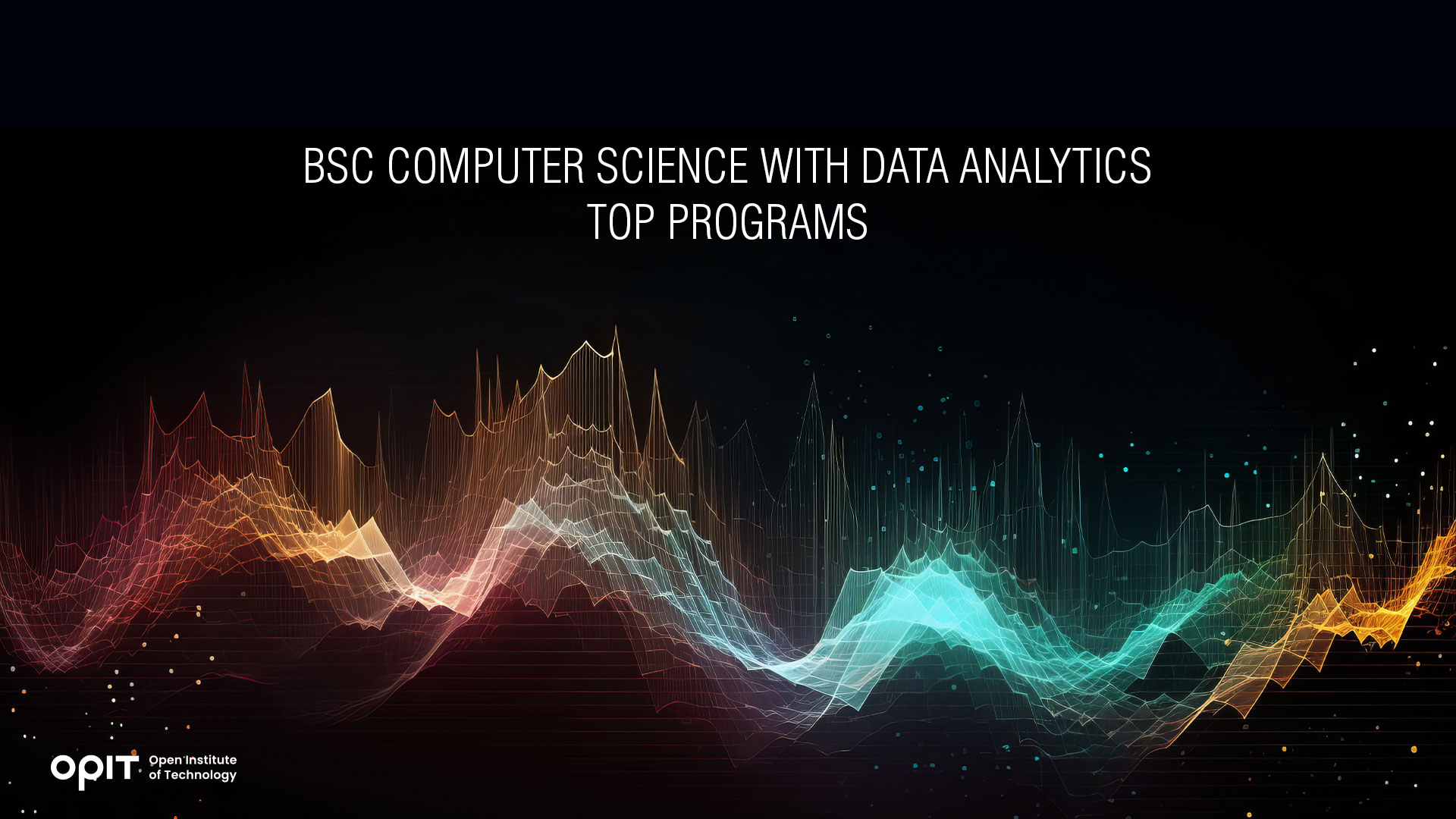Data analytics is a science that is all about taking raw datasets and translating them into insights that you (or others) can use. Think of it as the conduit between the reams of data an organization collects and the management team. As a data analyst, you’re the person who makes sense of the numbers so management can take action.
At least, that’s how data analytics works in a business context. Switch to the research side of things and you’ll play a crucial role in interpreting the results of complex experiments by helping researchers understand the factors that lead to their results and the effects of changes they make.
Getting your start in this field usually requires you to complete a BSc in computer science with data analytics. This article looks at five of the best options provided by some of the world’s top universities.
Top BSc Degrees in Computer Science With Data Analytics Programs
In creating our list of the five best BSc computer science with data analytics programs, we considered the following criteria:
- Reputation – A good reputation is like word of mouth for a university. We looked for institutions that have an established track record of quality courses, both in the AI field and outside of it.
- Curriculum – Many computer science degrees have an analytics component but don’t focus on it as a specialization. The courses we chose put data analytics in the spotlight.
- Faculty Expertise – Who wants to learn from people who don’t have solid reputations in the data analytics industry? The people who teach you are as important (perhaps even more important) as the content they teach.
- Industry Connections – A good course is like a tree. The course itself is the trunk, which then branches off into all sorts of industries. You want a course with plenty of branches (i.e., many paths into the industry).
- Support and Resources – Data analytics isn’t a simple concept that you can pick up with a few hours of study. It’s like a vast ocean and it’s easy to get lost. The right support and resources are like a compass that keeps the student on track.
Check out OPIT degrees
-
Career aligned
-
Fully Online
-
EU-accredited institution
Top Programs
With the above criteria in mind, we’ve collected five great BSc computer science with data analytics programs for you to consider.
1 – Computer Science With Pathway in Data Analytics (Middle East College)
When universities come together, the result is usually a top-notch degree that allows you to draw from global expertise. That’s what you get with Middle East College’s course, as it’s offered in conjunction with the UK’s Coventry University.
It’s an eight-semester course that focuses on data collection, codification, and treatment, with as much importance placed on practical application as on academic theory. Entry requirements are strict and require:
- A General Education Certificate (GEC) or similar
- Either a General Foundation Programme (GFP) certificate or a passing grade in the university-administered MEC placement test
- Scoring 60% or above in each component of the MEC is a must if you want to use it to replace a GFP.
The big selling point for this course is the link to Coventry University, which has been among the top 15 universities in the UK for over half a decade. That link also creates career opportunities, with the Middle East College faculty exposing you to Asian opportunities while Coventry University can provide a route into the UK for international students.
2 – Bachelor of Science in Data Science and Analytics (St. Ambrose University)
Ranked as the top data analytics program in the world by Bachelor Studies, St. Ambrose’s course is a four-year degree that offers internships to some of the world’s leading companies. This internship program is so extensive that over 75% of the university’s students end up with a work placement that can provide them with a direct route into a career.
As for the course itself, you’ll develop foundational knowledge in statistics and computing before moving on to practical ways to apply that knowledge. The course also has an ethical component, which is crucial given the potentially controversial means some companies use to collect data.
International students need to achieve the equivalent of an American 2.5 out of 4.0 Grade Point Average (GPA), making this one of the easier courses to get onto. You also have to complete a Declaration of Finances form (available via the university’s website) to demonstrate proof of funding for your studies.
3 – BSc Digital Business & Data Science (University of Applied Sciences Europe)
The Hamburg-based University of Applied Sciences Europe is among the top 25 private universities in the continent and it’s a popular choice for international students. Its BSc computer science with data analytics program is interesting because it combines the fundamentals of data science with business concepts. Beyond learning advanced programming and analytics concepts, you’ll discover how those concepts apply in fields as varied as economics and cybersecurity. Throw in some marketing and entrepreneurship modules and this is an excellent choice for the prospective start-up owner.
Entry requirements are fairly simple. You’ll need proof of a high school diploma (or your country’s equivalent), which you submit alongside a CV and demonstration of English-language proficiency. A passing grade in an IELTS or TOEFL exam should do the job for the latter requirement.
Non-EU students have an extra hurdle to jump – a tuition deposit. You have to pay €3,000 upfront, which serves as a reservation fee for the course. The good news is that this fee counts toward your full tuition, so it’s deducted from the total. Think of it as paying money upfront for a restaurant reservation, with that money going toward the final bill.
4 – Data Science BSc (Warwick University)
Ranked as the 10th-best university in the UK and in the top 100 in the world, Warwick University is a good performer in terms of pure credentials. But the school’s state-of-the-art statistics department makes it stand out, with its research department being touted as “world-leading.”
Its Data Science BSc takes in plenty of the skills you’ll use in data analytics, including how to parse through massive datasets to get to crucial information. The scope of this work is particularly impressive, with the course teaching how data analytics applies in industries as varied as finance and social networks. Studying (and even working) abroad is also offered to those who want to build their networks through their studies.
Entry requirements are stringent, with students generally expected to have at least two (and usually three) A* A-Level grades, or equivalents, to get in. The university’s website digs into more specific requirements for international students. This is an English-language course, too, so you’ll need proof of your English-speaking abilities or have to pass the university’s Pre-Sessional English Course before you’re considered for entry.
5 – BSc in Data Science and Analytics (National University of Singapore)
Ranked as the 11th best university in the world by QS University Rankings, the National University of Singapore is a trailblazer in the data analytics field. To get in, you’ll need to show the equivalent of an H2 pass in mathematics or further mathematics, which is roughly equivalent to an A grade at A-Level in the UK.
The course itself is a four-year honors program that starts by teaching you the foundational analytical methods applied in data science. From there, it branches into teaching how these concepts apply in real-world scenarios before introducing you to tools and techniques you’ll use in practical work.
Experiential learning is key to the course, with the National University of Singapore calling it “industry-driven” to highlight that this is a course that teaches you how to drive the car, as well as showing you what lies under the hood. To support this approach, the university runs its “Co-operative Education Programme” which combines academic study with several internships over four years of study.
Check out OPIT degrees
-
Career aligned
-
Fully Online
-
EU-accredited institution
Benefits of Pursuing a BSc in Computer Science With Data Analytics
By now, you’re probably asking yourself a big question: “Why should I study a BSc in computer science with data analytics?
Reason 1 – Develop In-Depth Knowledge
A data analytics bachelor’s degree teaches you how to use the tools and techniques needed in the field. But the theory that underpins those tools, along with the programming languages you’ll use, is near-universal in terms of its usefulness. As a result, following this degree track opens up career opportunities that extend into the software programming and computing fields, as well as analytics.
Reason 2 – Enhanced Employability
Building on the previous point, the skills you develop as part of a BSc in computer science with data analytics will make you seem like the goose that lays the golden eggs to employers. You’ll have such a varied skillset that you can lend your hand to almost anything in the computing sector. Salaries are solid, too, with data analysts earning an average of €55,000 per year in Germany alone.
Reason 3 – Opportunities for Further Education
If a data analytics BSc is the equivalent of drawing up a blueprint for a house, later educational pursuits are all about building that house into something special. These courses lay the groundwork for later education (such as OPIT’s Master in Applied Data Science and AI), in addition to making it easier for you to earn professional certifications that look great on your CV.
Tips for Choosing the Right BSc Computer Science With Data Analytics Program
Right now, you’re at a crossroads that seems to branch off into an infinite number of paths. There are so many data analytics courses to choose from that it’s hard to know which way to turn. Use these tips to ensure you pick the right one:
- Align your course selection with your career goals – if it doesn’t take you closer to where you want to be then it’s not the course for you.
- Dig deeper into what each course offers by comparing curricula to see which courses have gaps and which cover everything you want to learn.
- Location and general student life are important because you need to have a life outside of education, so pay attention to both.
- The cost of tuition can often be like a brick wall to students, but research into financial aid often helps you to find the ladder that gets you over that wall.
- If you have the opportunity, speak to faculty and alumni to discover what makes the course so special.
Keep Exploring to Find the Right Course for You
The five programs covered here are among the best BSc computer science with data analytics courses in the world, but that doesn’t necessarily mean they’re right for you. Exploration is key, as you must transform into an explorer to navigate your way toward the course that fits your needs from career, life, and passion perspectives. Make the right choices, and you’ll put yourself on course for a data-driven career that’s rewarding on both the mental and financial levels.






